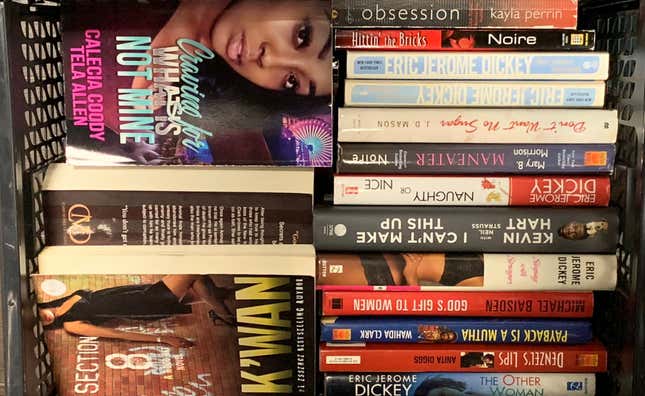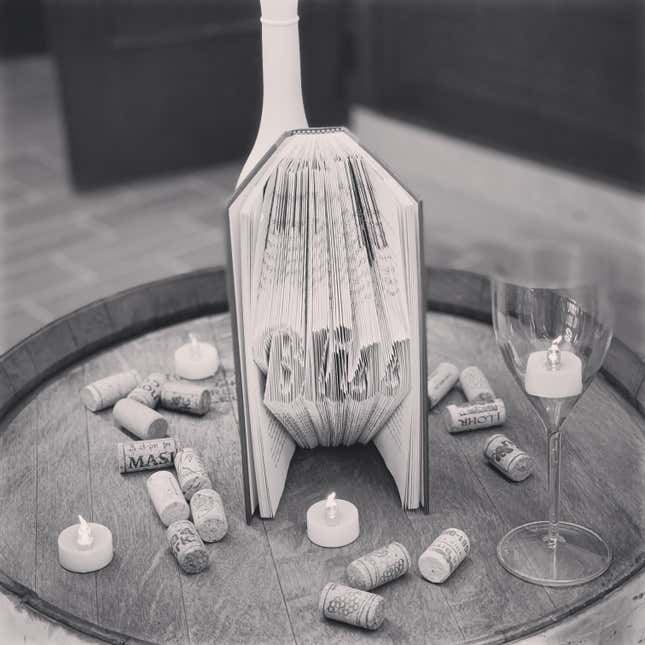
Every other month, I go to the Books for International Goodwill sale in Annapolis, Md. It starts at 8 am and I’m an early riser anyway, so I drive the 40 minutes from southeast Washington, DC on a virtually trafficless highway to get there when the only other people are a few solo shoppers and the chipper tribe of senior volunteers. For an hour, sometimes longer, I cruise the warehouse aisles, commandeering space in front of the African-American books.
My strategy: load my shopping bag with any book I’m even just a little interested in. Scan the fiction, religion, history and women’s sections for errant gems; and, right before checkout, have a realistic self-talk about which titles I’m most likely to actually read and which ones are predestined to be bookshelf décor. I purge, reshelve and buy accordingly—$3 for hardcovers, $2 for paperbacks. (Afterward, I go get chicken and waffles at Miss Shirley’s. That’s not pertinent to the used book shopping; it’s just one of my favorite parts of the routine.)
I’ve made some magical purchases at this particular sale: a first-edition of Roots, an autographed copy of a Maya Angelou cookbook. But my favorite has been a vintage hardback of Nella Larsen’s Passing, so old its pages tanned with age, and inside the back cover, someone who owned it a long time before I did had tucked away an Amtrak ticket and a graduation invitation with a short note of gratitude. “I’m so excited to see you,” they wrote in ornate, swoon-worthy cursive. Finding a story in a story is part of the magic of previously owned books.

“I love used books; one, because of the discount. But I love books that are in great condition, that have been read and well-loved. It’s just like, ‘I want to take care of this book as well,’” said La’Nesha Frazier, who co-owns Kansas City-based bookstore Bliss Books and Wine with her sister, La’Nae Robinson. The literary entrepreneurs sell new and used books on their website, from T.D. Jakes’ titles to the Hunger Games series. So, I checked in with the duo to ask: How can you find used books to read, love and expand your library? Here are some tips:
Browse online sellers. The in-person book-shopping experience is a literary lovers’ delight—just walking into a store and seeing books, books everywhere, is a jolt of joy. You miss that when you’re shopping online. Like most small business owners, Frazier and Robinson had to pivot when the pandemic hit, just as they’d started shopping for a brick-and-mortar storefront.
“We went from having pop-ups and author spotlights in-person to everything being online. But we were able to reach a wider demographic outside the Kansas City area,” said Frazier. “We were reaching people from Virginia and Texas and California. All of those people were visiting our website to purchase.”
New book sales stayed steady, she added, but used book purchases slowed down, which means many sellers may have inventory to move. And because used books are generally less expensive, you’re likely to be able to get two or three used books for the would-be cost of one fresh-off-the-press one.
Hit a library sale. A used book that has lasted a life cycle in the library is extra resilient—many publishers produce “library editions” with sturdier bindings to withstand excessive handling by patrons, so they’re generally not tattered or beat up. “I’m like a kid in a candy store at a library sale,” Frazier laughed. “They’re held all throughout the year and some libraries have them multiple times a year.”
Books are usually always hardcovers and cost a few dollars—the Baltimore County Library sale is one of my favorites because they have some 20,000 books, all less than $5 each—and some offer bundles or buy one, get one deals to get the surplus out the door. Now that everyone has had time to clean out their closets, basements and junky spare bedrooms, more book used donations will be coming into sellers. Also worth checking out: yard/garage sales, thrift stores and estate sales of personal library books, generally marked “ex-libris,” which means “from the library of” in Latin.
Change your shopping approach. Used books also give us access to literary jewels that are no longer in publication, Robinson reminds us. “Sometimes you can find copies that aren’t available anymore, something that you can’t just go out and get anywhere. I like great finds that are out of circulation. There are some stores that specialize in hard-to-find books and first editions.”
Like thrifting (another sport I excel in), shopping for used books is more like finding a jewel among other folks’ undesirables. If you have trouble finding a specific title or author, curate a mental list of topics that you love to read about—Harlem Renaissance fiction, civil rights-era memoirs, the post-Reconstruction South—and use that as a broader starting point for more fruitful searches and come across titles you may not have heard about before.

